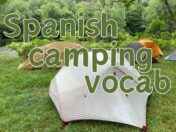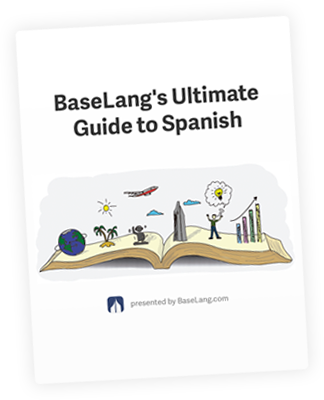Spanish Augmentatives: Instantly Boost Your Vocabulary

Get our free email course, Shortcut to Conversational.
Have conversations faster, understand people when they speak fast, and other tested tips to learn faster.
More infoIn a previous post, we gave you the lowdown on Spanish suffixes and prefixes, and now, it’s time to have an in-depth look at Spanish augmentatives, which themselves are a type of suffixes.
So what are Spanish augmentatives?
As the term indicates, augmentatives typically make the root word bigger or add greater intensity to that word. As you will see, depending on the tone and context, Spanish augmentatives can also be used to talk in a disparaging or disapproving way.
Depending on the augmentative that is used, the meaning can change slightly, or a lot.
For example, let’s take the word cabeza, which means “head” in English.
When we use suffixes to form Spanish augmentatives, the result is:
- Stubborn – cabezota
- Pig headed – Cabezón
- Header – Cabezazo
As you can see, the meaning varies a lot.
Spanish augmentatives can be formed from verbs or adverbs, turning them into adjectives.
| Spanish Original Word | English equivalent | Augmentative | English equivalent |
| Llorar | To cry | Llorón | Weepy |
| Bueno | Good | Buenazo | A very good person |
| Comer | To eat | Comelón | Glutton |
They can also be formed from nouns, and depending on the augmentative, may or may not change the meaning or intensity of that noun.
| Spanish Original Word | English equivalent | Augmentative | English equivalent |
| Fiesta | Party | Fiestota | Big party |
| Película | Movie | Peliculón | Great movie |
Common Spanish Augmentatives
It’s worthing mentioning that there is no general hard and fast rule for how to form Spanish augmentatives, or when to use them. You simply need to memorize them and then imitate how native Spanish speakers use them.
You may even notice that some augmentatives are more commonly used in certain Spanish speaking countries – for example, some native speakers will use the word “fiestón” to describe a big party, while others will use “fiestota” for the same idea.
In the next couple of sections, we’ll cover the most commonly used Spanish augmentatives that you’ll hear in conversations with native Spanish speakers.
- Spanish augmentatives ending in -ÓN – ONA
- Spanish augmentatives ending in OTE – OTA
- Spanish augmentatives ending in AZO – AZA
- Spanish augmentatives ending in -UCHO – UCHA
1) The endings -ÓN – ONA
One of the most used suffixes, these Spanish augmentatives are usually used with nouns to form adjectives in a derogatory way, and also verbs to talk about impetuous or violent actions.
Let’s see some examples
| Original word | English equivalent | Spanish Augmentative | English equivalent |
| Barriga | Belly | Barrigón / Barigona | Potbellied, Paunchy |
| Empujar | To push | Empujón | Shove |
| Cachetes | Cheeks | Cachetón / Chachetona | chubby cheeks |
| Bofetada | Slap | Bofetón | Big slap |
| Grito | Scream | Gritón / Gritona | Loud person |
| Comer | To eat | Comelón / Comelona | Glutton |
| Soltero | Bachelor | Solterón | Old bachelor |
| Soltera | Bachelorette | Solterona | Spinster |
Examples:
- What a beautiful baby, look those plump cheeks! – ¡Qué bebé tan hermoso mira que cachetón!
- If you don’t dare to meet new people, you are going to be an old bachelor – Si no te atreves a conocer gente nueva, te vas a quedar solterón
- The teacher punished the child at school, because he gave another student a shove – La profesora castigó al niño en el colegio, porque le dió un empujón a otro estudiante
Not all Spanish augmentatives that use this suffix are derogatory. Sometimes, the suffix simply changes the size or meaning of the original word.
For example:
| Original word | English equivalent | Spanish Augmentative | English equivalent |
| Silla | Chair | Sillón | Armchair |
| Mesa | Table | Mesón | Counter |
| Vela | Candle | Velón | Oil Lamp |
| Botella | Bottle | Botellón | Big bottle |
2) The endings -OTE -OTA
Although the meaning will vary depending on the word that is being modified, in general, these suffixes are used in an ironic way to imply that something is excessive or exaggerated.
| Original word | English equivalent | Spanish Augmentative | English equivalent |
| Muchacho | Boy | Muchachote | Big boy |
| Muchacha | Girl | Muchachota | Big girl |
| Perro/Perra | Dog | Perrote / Perrota | Big dog |
| Amigo / Amiga | Friend | Amigote / Amigota | Buddy |
| Grande | Big | Grandote / Grandota | Huge |
| Gafo | Dumb | Gafote | Very dumb |
| Hombre | Man | Hombrezote | Really big and handsome man |
| Mujer | Woman | Mujerzota | Really big and handsome woman |
| Abrazo | Hug | Abrazote | Big hug |
| Gato/Gata | Cat | Gatote / Gatota | Big cat |
| Casa | House | Casota | Really big house |
| Cama | Bed | Camota | Big bed, queen size bed. |
| Barriga | Tummy | Barrigota | Big tummy |
| Teléfono | Phone | Telefonote | Fancy cell phone |
| Cerebro | Brain | Cerebrote | Brainiac. Very intelligent |
Examples:
- Look at you! You are a big boy now – Mírate, ya eres todo un muchachote
- Julia just adopted a beautiful big dog – Julia acaba de adoptar un perrote hermoso
- You can’t be that dumb, don’t you see that they make fun of you? – No puedes ser tan gafote. ¿No ves que se burlan de ti?
- She is a complete brainiac. He is 16 years old and is already in college – Ella es todo un cerebrote. Tiene 16 años y ya está en la universidad
3) The endings -AZO -AZA
These suffixes are used in a similar way to the first category and typically increase an negative aspect of something. However, they can also express sudden actions or blows made with objects.
If the word ends in a vowel (a,e,i,o,u), you will change the last vowel by the suffix
| Original word | English equivalent | Augmentative | English equivalent |
| Zapato | Shoe | Zapatazo | Hit by a shoe |
| Cabeza | Head | Cabezazo | Header |
| Botella | Bottle | Botellazo | Hit by a bottle |
| Codo | Elbow | Codazo | Nudge |
Examples:
- I had to nudge my brother to shut up – Yo le tuve que dar un codazo a mi hermano para que se callara
- Someone just bottled me – Alguien me acaba de dar un botellazo
- She was so upset that she threw a shoe at the door – Ella estaba tan molesta que lanzó un zapatazo a la puerta
There are some exceptions whereby the suffixes increase the size of the original word in a positive way.
| Original word | English equivalent | Augmentative | English equivalent |
| Bigote | Mustache | Bigotazo | Great mustache |
| Foto | Picture | Fotaza | Great picture |
| Éxito | Success | Exitazo | Great success |
| Hotel | Hotel | Hotelazo | Big and fancy Hotel |
Examples:
- We have stayed in a spectacular hotel, when we went to Buenos Aires – Nos hemos quedado en un hotelazo espectacular, cuando fuimos a Buenos Aires
- The presentation of the new product was a huge success. Everyone liked it – La presentación del nuevo producto fue un exitazo. A todos les gustó
- What a beautiful photo of El Ávila. Did you take it? – Que fotaza tan hermosa de El Ávila. ¿La tomaste tú?
4) The endings -UCHO – UCHA
Used when you wish to show contempt towards something or someone. If the word ends in these suffixes, then it will always have a negative connotation.
| Original word | English equivalent | Augmentative | English equivalent |
| Casa | House | Casucha | Slum house |
| Café | Coffee | Cafesucho | Bad coffee |
| Médico | Doctor | Medicucho | Bad doctor |
| Flaco | Thin | Flacucho | Scrawny |
| Vieja /Viejo | Old Lady or an old thing (feminine) | Viejucha, Viejucho | Very Old |
Examples:
- I do not like that patisserie, they serve a horrible bad coffee – No me gusta esa pastelería, sirven un cafesucho horrible
- You are scrawny, what happen to you? – Estás muy flacucho, ¿que te pasó?
- This dress is very old, and I don’t want to wear it – Este vestido ya esta viejucho, no quiero usarlo
Spanish Augmentatives: Exercises
Choose the right augmentative. Scroll down for answers.
A) Casa (House)
- Casota
- Casón
- Casita
B) Pueblo (Town)
- Pueblito
- Puebleño
- Pueblucho
C) Grande (Big)
- Grandón
- Grandaza
- Grandote
D) Plato (Dish)
- Platico
- Platazo
- Platucha
E) Bigote (Mustache)
- Bigotudo
- Bigotazo
- Bigotito
F) Gato (Cat)
- Gatiño
- Gatucho
- Gatote
G) Puerta (Door)
- Portazo
- Puertin
- Puertucha
H) Amigas (Friends)
- Amigonas
- Amigotas
- Amiguitas
I) Mandar (To command)
- Mandota
- Mandona
- Manducho
J) Rodilla (Knee)
- Rodillazo
- Rodillucha
- Rodillita
Spanish Augmentatives: Answers
A) Casa
- Casota
- Casón
- Casita
B) Pueblo
- Pueblito
- Puebleño
- Pueblucho
C) Grande
- Grandón
- Grandaza
- Grandote
D) Plato
- Platico
- Platazo
- Platucha
E) Bigote
- Bigotudo
- Bigotazo
- Bigotito
F) Gato
- Gatiño
- Gatucho
- Gatote
G) Puerta
- Portazo
- Puertin
- Puertucha
H) Amigas
- Amigonas
- Amigotas
- Amiguitas
I) Mandar
- Mandota
- Mandona
- Manducho
J) Rodilla
- Rodillazo
- Rodillucha
- Rodillita




